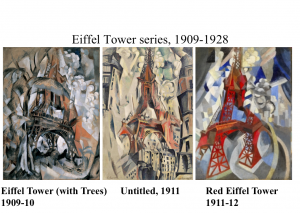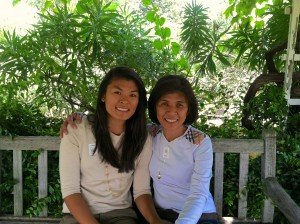Hi folks! Spring courses are now up on the portal, and many of you, I’m sure, are busy deciding what classes to take. One of the main reasons I chose a liberal arts college is that I sincerely believe in the benefit of a wide breadth of study. But looking at the class lists, major requirements, and general education requirements can be overwhelming. As a freshman, I felt like it would be impossible to fit everything I wanted to do at Scripps into just four short years. For sophomores in particular, this is a stressful time. We are normally required to declare our majors by the end of the year (or sooner if you’re going abroad early!), and many of us consider spring courses our last chance to “experiment” and get a taste for the coursework in a major. The process of choosing a major was covered just last week by a wonderful fellow blogger, Jenny (read her awesome post), but I’ve just officially declared my major and wanted to add my own experience to the mix.
The way I saw it, I had two ways to decide: I could choose based on the academic and professional experiences I’d enjoyed in the past, and on the academic and professional future I wanted to have. Now, I understand that one’s undergraduate studies aren’t necessarily linked to one’s professional aspirations; even pre-health and pre-law students are free to major in unrelated fields. But for financial reasons, I’d like to be as well situated as I can for a job immediately after graduation. (I’ve also heard rumblings that 2-3 years of work experience are all but required before pursuing an MBA.) After graduation, I am debating whether to pursue a certificate in art appraisal studies or public accounting (maybe both?), or perhaps attend graduate school. For the purposes of this blog post, I’ll identify the most influential events related to my decision to major in Economics-Accounting and minor in Art History.
My Mom (Not an event, but my mom is always an exception!)
My mother has always supported my education, and she has never tried to limit my freedom to choose an academic path. That being said, I was raised in a very money-conscious household, and I am expected to be financially secure and contribute to my family’s income after graduation. Entering the business world is definitely not the only way to make a living, but it is the path that is most familiar to me. My mother has worked as a payroll accountant at a large company for years, and one of my most vivid memories from middle school is of helping her alphabetize timesheets when she brought her work home with her. She also taught me how to balance a checkbook in third grade and brought me into the local Bank of America branch to learn the difference between checking accounts, savings, and certificates of deposit when I was thirteen. This practical upbringing, combined with my family’s expectations of financial independence, is the main reason I gravitated towards economics-accounting when I first came to Scripps.
AP Art History

A slide from my presentation. Delaunay painted work in series, returning to certain styles or symbols time and time again.
I took this course as a high school senior. After presenting in class on how Robert Delaunay’s personal experiences with war, traveling, and love corresponded with recurring images in his art, I knew I’d found a passion. For those of you who have never taken an art history course, it’s like learning about historical society, politics, religion, and economics, all through pictures, because each artwork’s style, iconography, and context tells a story.
Writing 50, Regulating the Emerging Art Finance Industry
This research paper (you can read it here) lit a fire under me; it has driven every decision I make regarding coursework, internships, and study abroad. Art investment is an exciting, new field at the intersection of art and business; my research helped me discover this professional niche, which incorporates my two strongest interests. My primary career goal is to help individuals manage their investments, with an emphasis on exploring art as an alternative asset class.
Core II: Economics of Gender and Choice
This course was team-taught by Professors Nancy Macko and Sean Flynn. We talked about gender constructions in the workplace and achieving a sense of equity in relationships. The main point I took away is the importance of balancing one’s financial and emotional needs. I don’t want to pursue a one-dimensional career purely in art or purely in business; through my final decision, I know I am being both practical and passionate.
Internship at the Ruth Chandler Williamson Gallery
This summer was so passionately satisfying. To hear about what I did and what I learned, read here.
Boston University London Internship Program-Spring 2014
Okay, okay, I haven’t exactly left yet, but I’m bouncing on my toes!
I hope hearing about my experience helps you consider your own personal, academic, and professional context as you commit to a course of study. What courses, projects, or work experiences have you enjoyed so far? What pressures are you under, and how flexible are they? What makes you happy? If your only answer right now is “helping people”, be more specific. Do you want to help them attend college, manage their wealth, express themselves, or develop? Why? What kind of people–children, students, adults, or seniors?
Other sources to consult:
- Academic Adviser
- Juniors and seniors in your prospective major. Don’t know anyone personally? Ask your professor to put you in touch. It’s not awkward unless you make it awkward!
- CP&R- Set up an appointment with a Career Counselor or visit their library. There are titles like What Can You Do with a Major in ___? You may also want to take a personality test/career indicator, if you haven’t done so already.
- Peer Mentors/RA’s-Last week they sponsored an event called “Classes, Concerns, and Cookies”. They’ll have templates to outline courses and food. If you couldn’t make it, make your own template by drawing a 4×3 table on a sheet of paper: one row for each year; one column each for fall, spring, and summer. (Type A tip: write each class or internship/fellowship opportunity on a small post-it note and mark major/minor requirements with certain colors. You’ll be able to rearrange and visualize your future plans easily)
- Registrar- If your academic adviser can’t answer your questions, make an appointment with the Registrar’s office to count up all of your credits and make sure you can graduate on time.





